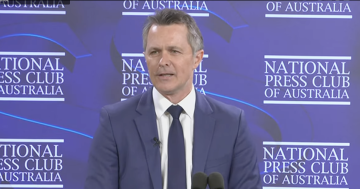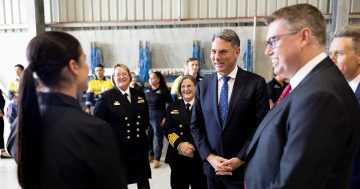
Higher education leaders asked for submissions. Photo: University of Canberra.
Education policy across Australia is set for a massive overhaul, with the Federal Government challenging leaders to step up and be more imaginative in their approach to teaching and devising curriculum.
Using his appearance at the Universities of Australia conference this week, Education Minister Jason Clare said the universities accord wanted creative input to establish a long-term vision.
“This room is full of a lot of smart and imaginative people,” the minister said during his keynote address at the conference dinner.
“In this room are the brains and ideas that can help reshape and reimagine higher education, set it up for the next decade and beyond.”
The minister launched a discussion paper suggesting that more than 90 per cent of new jobs will require higher education qualifications within the next three years.
More than half of those jobs will require a bachelor’s degree or higher.
The Australian Universities Accord panel will oversee the discussion paper, and Mr Clare called for contributions to help future-safe education policy.
“We want ideas that can help reshape and reimagine higher education and set it up for the next decade and beyond,” Mr Clare said.
“More than nine in ten jobs in the future will require post-school qualifications, so it is critical that we build a higher education sector that is fit for purpose.
“This is about creating a sector that meets future skills needs and delivers real opportunity for all Australians regardless of their background.
“I want this to deliver a blueprint for real and long-lasting change.”
Noting that the panel’s discussion paper includes modelling pointing to more school leavers over the next decade, Mr Clare urged higher education providers to work more closely with industry.
Much of what is being taught should be geared towards the needs of the workplace.
“We want ideas that can help reshape and reimagine higher education and set it up for the next decade and beyond.”
Accord panel chair Mary O’Kane noted that the government was accepting submissions about the discussion paper until 11 April.
“Australian higher education is very good by world standards,” Professor O’Kane said.
“But we need it to do more to bridge a large part of the skills gap and to increase significantly the production of new knowledge in areas of national need. We want to hear big ideas. Think outside the box and beyond the immediate challenges and pressures to 30 years in the future.
“Ask yourself, what kind of system does Australia need in 2030, 2040 and 2050, and what can we do to get there together?
“Tell us how to enable the system to do this and to do it quickly. Be bold and lateral in your suggestions. Draw on international evidence and individual experiences.”
The Accord’s discussion paper seeks input on the major challenges and opportunities facing the sector, including:
- Meeting Australia’s knowledge and skills needs
- Access and opportunity
- Investment and affordability
- Governance, accountability and community
- The connection between vocational education and training and higher education systems
Quality and sustainability - International education, and
- Delivering new knowledge, innovation and capability.
Submissions can be made via the Accord’s website.




















